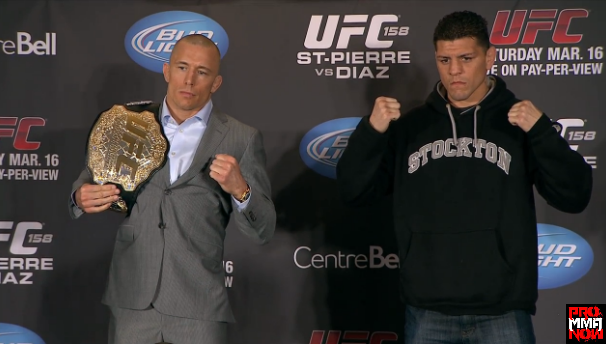Nick Diaz needs a hundred thousand. Not a hundred grand or a hundred large, but 100,000 signatures. And he needs them by the end of the day on Friday in order to get an official White House response to the five-year suspension and $165,000 fine handed down last month by the Nevada Athletic Commission (NAC). Will the
Nick Diaz petition reach its goal? It should end up roughly 15,000 votes short
unless the mixed martial arts (MMA) community steps up to change the current trends.
Consider the common factor between the right of a Down syndrome-afflicted MMA fighter, Garrett Holeve, to
compete in Florida and the right to
legally unlock your cell phone. Both were made possible due to online petitions. Such online petition forums are common in other countries and vary in their thresholds. In the United Kingdom, an online petition requires 10,000 signatures to qualify for an official governmental response and any petition attracting more than 100,000 signatures is assured of a parliamentary debate. To qualify for action from the U.S. White House, the
Nick Diaz petition needs 100,000 signatures by the end of Oct. 16[SUP]th[/SUP].
When the analyses of this piece were performed, there were over 75,000 signatories to the petition in just over three weeks, making it the fourth most popular petition out of almost 100. In this respect, Nick Diaz has more public support than gun control, Medicare and the Planned Parenthood controversy. It looks like it won't be enough, though.
The petition is projected to close with
84 to 86,000 signatures by the deadline at the end of this week. That's excruciatingly close to success and would basically mean that if one out of every five people who signed the petition had found just one extra person to sign on, the threshold would've been met.
But all hope isn't lost quite yet. There's still one statistical factor that could change the outcome: The structural break. A structural break is an abrupt change in time series data, and in this case it would come from influential people or organizations driving traffic to
the petition. The trend in new signatories has been exponentially decreasing from 8,000 per day in the first week to 1,400 in the second week to even fewer since. Yet every time the petition is featured outside the MMA community, there's been a pronounced spike in signatures. On Sept. 27[SUP]th[/SUP], the Boston Herald ran an article on the Nick Diaz case and provided a
link to the petition. By back-of-the-envelope calculation, the story resulted in 4,000 additional signatures. Then on Oct. 4[SUP]th[/SUP], pop icon Cher tweeted out a
link to the petition giving another striking increase, possibly adding up to 10,000 additional signatures over the next few days.
There are a host of MMA personalities and MMA-centric celebrities who've been vocal in their support to #FreeNickDiaz. Borrowing from
The Tipping Point, these individuals are essentially the "connectors" who bridge the gap between the MMA sphere and the mainstream community. While using the hashtag helps, many have yet to
share the actual petition with their followers. This is important because, in Mark Cuban terms, people tend to take the path of least resistance. It's one thing to show support for a cause, but quite another to make it easy for others to support said cause. Based on the current trends, a final push to the
petition website by the Shaquille O'Neal's, Dwayne "The Rock" Johnson's,
Ronda Rousey's, Travis Barker's, and, dare we say, Demi Lovato's of the world could make all the difference between a
popular Diaz petition and a
successful Diaz petition.
Geographically,
the petition has received widespread global support with signatures originating from all over the world. (This is permissible as the White House has no residence requirements to be a signatory.) In fact, over a quarter of the signatures have come from countries like Canada, Ireland, Germany and Australia.
A heat map of signatures from the U.S. shows the strongest support across the southern-most parts of the country (California, Arizona, Texas, and Florida) and in New York where professional MMA isn't even legal (yes, we see you too, Indiana). Interestingly enough, in a case with a significant marijuana component, the six aforementioned states show
support for Nick Diaz across political and medical marijuana spectra. Two have governors who are democrats while four are republicans. Three allow for medical marijuana, three don't. There could be any number of causes but perhaps people feel this case is less about marijuana and more about justice.
Online petitions have had numerous successes from clemency for marijuana offences to forgiving of student loan debt to airline bans on the shipment of hunting trophies.
Nick Diaz's Lawyer, Lucas Middlebrook, believes the exposure and publicity of this petition can have "a positive effect" on the case and if the petition crosses the 100,000 signature threshold, any positive effect could grow multifold.
Based on our model, this will not happen. The petition will only garner around 85,000 signatures and fall short of the White House threshold. That is, unless influential people decide to structurally break from current trends and do something to
drive people to the petition website. Nick Diaz's case has struck a chord with tens of thousands of individuals across the world with different religions, different political views, different views on marijuana, and perhaps even different views on the sport of MMA itself. But they're united in the belief that a human being was wronged by a regulatory commission on Sept. 14.
The petition supporting this belief is a few days away from a surefire decision loss. It needs an
Anderson Silva triangle choke, a
Mike Russow straight right, a
Tim Boetsch-ian final round. But these things don't just happen. People have to make them happen.
You may have noticed the 15 links to the Diaz petition in this piece with at least one link in every paragraph. We were trying to put the path of least resistance into action.


